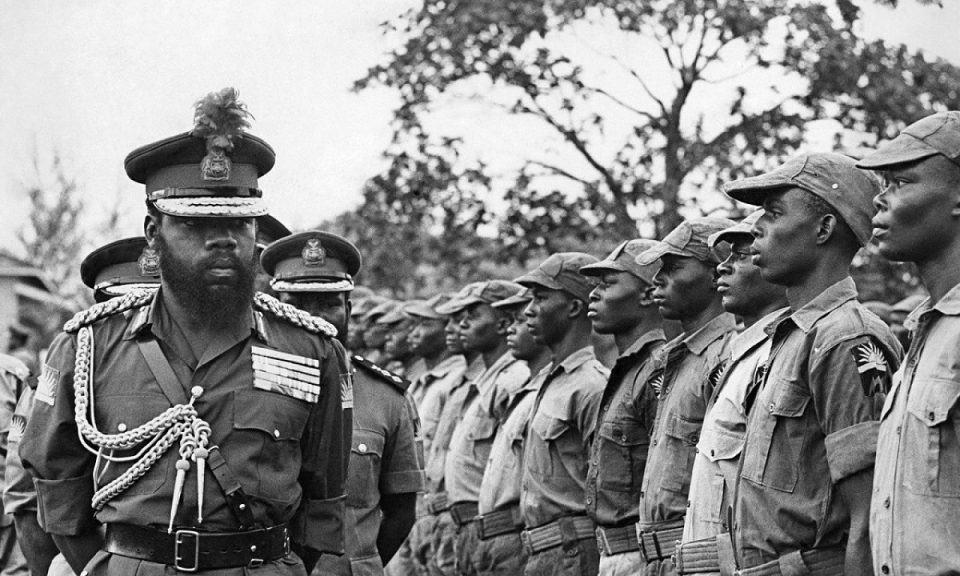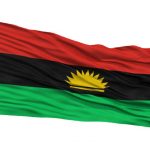Between 6th July 1967 – 15th January 1970 (2 years, 6 months, 1 week and 2 days), the loss of lives, particularly children from starvation continued with more than 10,000 deaths per day. Biafrans observe “Heroes Day Remembrance” to honor those killed during what the world called “The Nigerian Civil War or Nigerian-Biafran War”. A war that claimed approximately five million (5,000,000) lives.
General Yakubu Gowon headed the Nigeria government side while Lt. Colonel Odumegwu Ojukwu headed the Biafran side. More than five decades after the war that Nigerian side declared “No victor, No vanquished” at its end, clamor for the same Biafra Nation is still high and being championed by the “Indigenous People Of Biafra” (IPOB) headed by Nnamdi Kanu.
The population of the Biafrans before the war was estimated to be around 13,500,000, currently they are over 85 million. Because Igbo tribe made up of almost 70% of Biafra’s territories, some people thought it was an Igbo nation they were fighting for. The truth is that the Biafran territory is made up of other major tribes like; Anaang, Efik, Ibibio, Ijaw, Ogoni among others.
What happened before the war
The Igbos by nature are Republicans and very difficult to be tamed. They do not accept any form of subjugation, marginalization or Injustice and tyranny. They are gifted in all ramifications, they are smart, intelligent and innovative and this played out during the 2 years and 6 months war who were able to manufacture bombs, armoured tanks, guns and different kinds of equipment. They also had their own national bank and local currency called “Biafran Pounds” which was used during the war.
It was said that at the start of the civil war, Most Igbos withdrew all their money from Nigerian owned banks and converted it to the Biafran currency, “The Biafran Pounds”
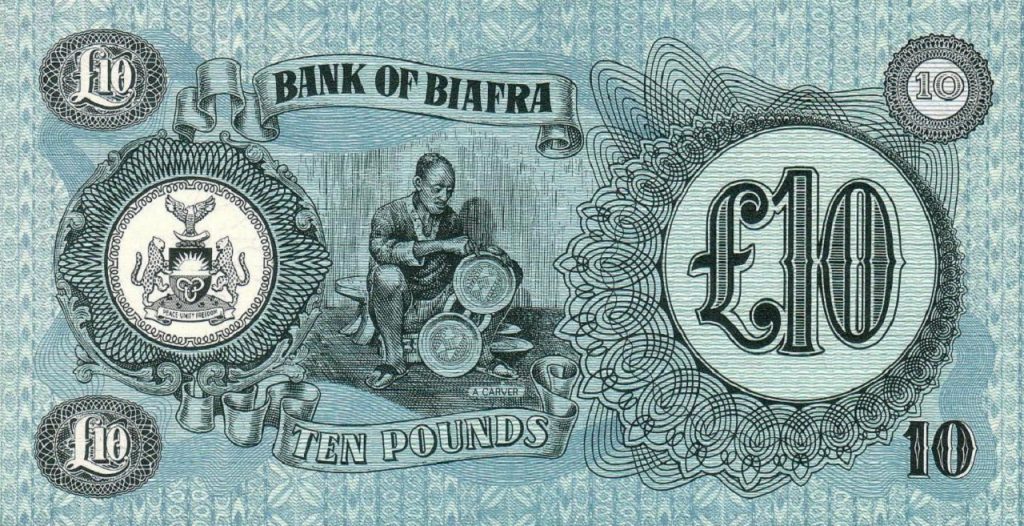
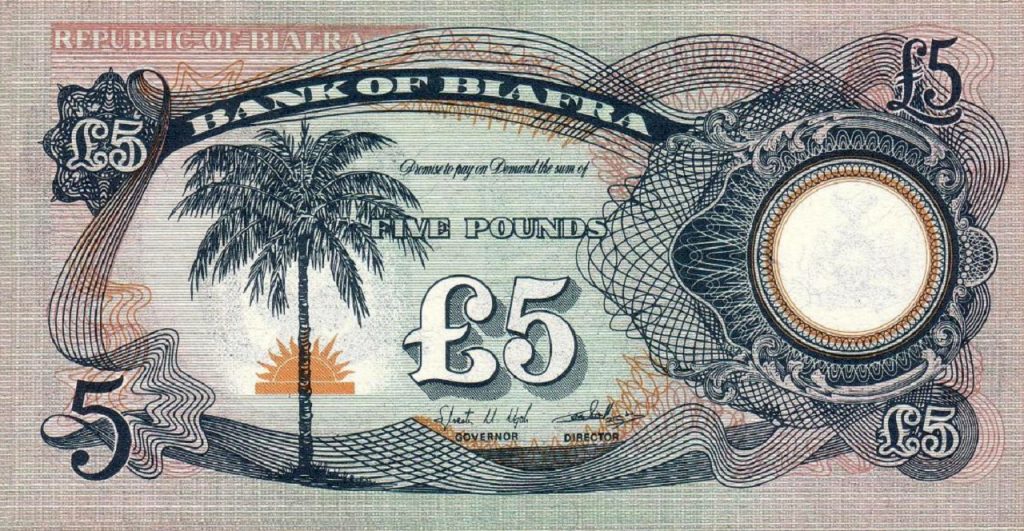
The nationalist aspirations of the Igbo people is represented by Biafra. After Nigerian independent in 1960, the federal government was made up of mostly Northern politicians and this made the Biafran leadership feel they could no longer coexist.
Not only that, the conflict equally resulted from economic, political, cultural, ethnic and religious tensions after the British colonization of Nigeria. Anti-Igbo pogroms in Northern Nigeria, including ethno-religious violence were the main cause of the war, though many have given different versions of the story as to what caused the war.
Coup and counter-coup, persecution of “Inyamiri” A Derogatory Word For Igbo living in Northern Nigeria and northern control of the oil wells and oil production in the Southern Niger Delta were among the many ingredients that combine to cause the war. Even after the war, these ingredients are still there.
At the start of the war, what caused the war?
The military leaders (Gowon, and Ojukwu) and other senior police officials of each region in January 1967, met in Aburi, Ghana and to agree on a less centralized union of regions (They agreed). The agreement called “Aburi Accords” was later rejected by the Northerners forcing Ojukwu to declare “The Republic of Biafra”.
The leader of the Western Region Obafemi Awolowo said that the Western Region would secede if the Eastern Region goes.
On return to Nigeria, the federal government repudiated the agreement, went on and declared the creation of new states to manipulate the Igbos in Biafra. Consequently, Ojukwu decided to secede from Nigeria.
He consulted community leaders of the Eastern Region and later declared the independence of the Republic of Biafra, pointing the killing of Igbos in the post-coup violence in the north as reasons for declaring Biafra independence. This declaration is believed to be the major factors that sparked the war.
Now, therefore, I, Lieutenant-Colonel Chukwuemeka Odumegwu Ojukwu, Military Governor of Eastern Nigeria, by virtue of the authority, and pursuant to the principles, recited above, do hereby solemnly proclaim that the territory and region known as and called Eastern Nigeria together with her continental shelf and territorial waters shall henceforth be an independent sovereign state of the name and title of “The Republic of Biafra”.
~ Ojukwu
During the war and why it turned out to be a genocide.
It is believed that Britain enforced land, sea and air blockade (through the Nigerian government) against the Biafrans leading to the death of over 3 million children due to starvation.
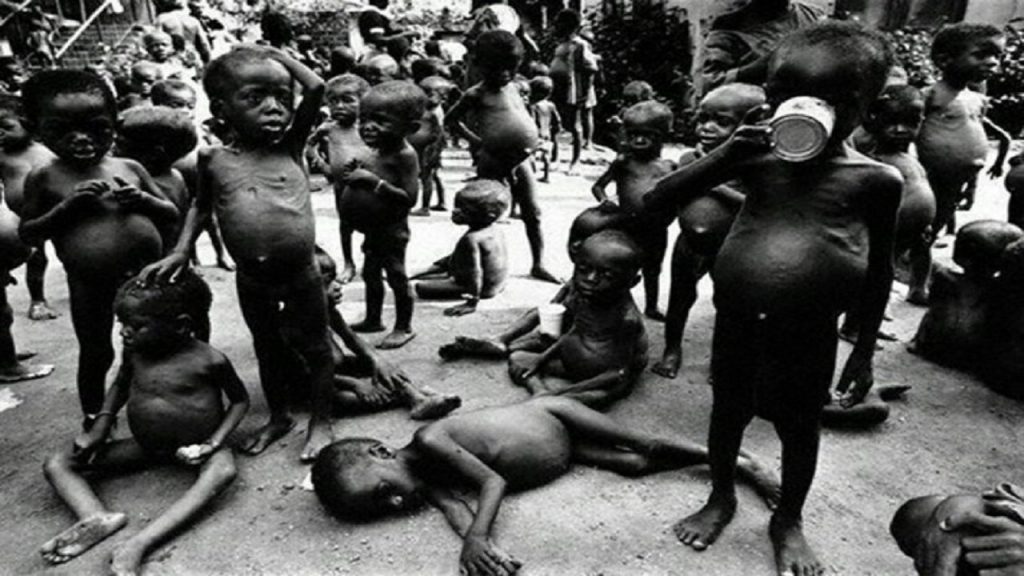
The young republic of Biafra was formally recognized by Tanzania, Ivory Coast, zambia, Haiti and Gabon. Other nations like France, South Africa, Vatican City, Portugal, Spain, Rhodesia and Norway offered assistance but didn’t offer formal recognition. Aids came from the Holy Ghost fathes of Ireland, Medecins Sans Frontieres and Us catholic Relief Services.
The Federal Military Government (FMG) was the first to attack Biafra on 6th July 1967. The fierce resistance displayed by the Biafran side proved Gowon wrong who said initially that everything will be over in 4 weeks. It took the Nigerian side who enjoyed the support of the Britain and other nations 2 years and 6 months to have upper hand in the war.
Initial efforts of the Nigerian Federal Military Government were unsuccessful as the Biafrans successfully launched their own offensive, and consequently captured Mid West areas in August 1967. The FMG regained the land by October 1967, through many offensive.
Why it turned out to be a genocide.
These Excerpts & Quotes were made during the war citing the aim to exterminate the Biafrans.
“I want to see no Red Cross, no Caritas, no World Council of Churches, no Pope, no missionary, no UN delegation. I want to prevent even one Ibo from having even one piece to eat before their capitulation. We shoot at everything that moves and when our troops march into the centre of Ibo territory, we shoot at everything, even things that do not move” (Benjamin Adekunle, Commander, 3rd Marine Commander Division, Nigerian Army to French Radio Reporter).
“Until now efforts to relieve the Biafran people have been thwarted by the desire of the central government to pursue total and unconditional victory and by the fear of the Ibo people that surrender means wholesale atrocities and genocide. But genocide is what is taking place right now and starvation is the grim reaper. This is not the time to stand on ceremony, or go through channels or to observe diplomatic niceties. The destruction of an entire people is immoral objective, even in the most moral of wars. It can never be condoned”, (Richard Nixon, during the presidential campaign, September 9, 1968)
“Starvation is a weapon of war, and we have every intention of using it against the rebels” (Mr Alison Ayida, Head of Nigerian delegation, Niamey Peace talks, July 1968.)
“The Igbos must be considerably reduced in number”, Lagos Policeman quoted in New York Review 21 December, 1967)
“All is fair in war, and starvation is one of the weapons of war. I don’t see why we should feed our enemies fat in order for them to fight harder”, (Chief Obafemi Awolowo, Nigerian Minister of Finance, July 28, 1969)
“Federal troops killed, or stood while mobs killed, more than 5000 Ibos in Warri, Sapele, Agbor” (New York Times, 10th January, 1968).
“It’s (mass starvation) is a legitimate aspect of war (Anthony Enahoro, Nigerian Commissioner for Information at a press conference in New York, July 1968)
“In some areas in the East, Igbos were killed by local people with at least the acquiescence of the Federal forces, 1000 Igbo civilians perished in Benin in this way” (Max Edward Reporter, reporter on the ground – New York Review, 21 December 1967).
“One word now describes the policy of the Nigerian military government towards secessionist Biafra: genocide. It is ugly and extreme but it is the only word which fits Nigeria’s decision to stop international Red Cross and other relief agencies from flying food to Biafra ( Washington Post editorial, July 2, 1969).
“The greatest single massacre occurred in the Igbo town of Asaba where 700 Igbo male were lined up and shot as terrified women/children were forced to watch” (London Observer, 21 January,1968)
“After federal forces take over Benin, troops killed about 500 Igbo civilians after a house to house search with the aid of willing locals” (Washington Morning Post, 27 September, 1967)
“Federal troops killed or stood by while mobs killed more than 5000 Ibos in Warri, Sapele, Agbor (New York Times, 10th January, 1968).
“There has been genocide on the occasion of the 1966 massacres, the region between the towns of Benin and Asaba where only widows and orphans remain, federal troops having, for unknown reasons, massacred all the men” (Paris Le Monde, 5th April, 1968)
“Bestialities and indignities of all kinds were visited on the Biafrans in 1966. In Ikeja Barracks (Western Nigeria) Biafrans were forcibly fed on a mixture of human urine and faeces. In Northern Nigeria numerous housewives and nursing mothers were violated before their husbands and children. Young girls were abducted from their homes, walking places and schools and forced into intercourse with sick, demented and leprous men” (Mr Eric Spiff, German War Correspondent, eyewitness, 1967)
“In Calabar, federal forces shot at least 1000 and perhaps 2000 Igbos, most of them civilians” (New York Times, 18th January,1968)
“The Nazis had resurrected just here as Nigerian forces” (Washington Post, editorial, July 2, 1969).
“Myself and the same UNICEF representatives went on to convey something of what lay behind this intransigence: Among the large majority hailing from that tribe who are the most vocal in inciting the complete extermination of the Igbos. I often heard remarks that all Nigeria’s ills will be cured once the Igbos have been exterminated from the human map.” (Dr Conor Cruise O’Bien, 21 December, 1967, New York Review
“The loss of life from starvation continues at more than 10,000 persons per day over 1,000,000 lives in recent months. Without emergency measures now, the number will climb to 25,000 per day, within a month and 2,000,000 deaths by the end of the year. The new year will only bring greater disaster to people caught in the passion of fratricidal war, we cant allow this to continue or those responsible to go free” (Senator Kennedy appeals to Americans, Sunday November 17, 1968)
“650 refugee camps, contained about 700,000 haggard bundles of human flotsam waiting hopelessly for a meal, outside the camps, was the reminder of an estimated four and half to five million displaced Kwashiokor scourge, a million and half children, suffer(ed) from it during January; that put the forecast death toll at another 300,000 children. More than the pogroms of 1966, more than the war casualties, than the terror bombings, it was the experience of watching helplessly their children waste away and die that gave birth to, a deep and unrelenting loathing. It is a feeling that will one day reap bitter harvest unless” (Frederick Forsyth, British Writer at Umuahia, January 21st 1969)
Images From the Nigerian-Biafran war (The Genocide)
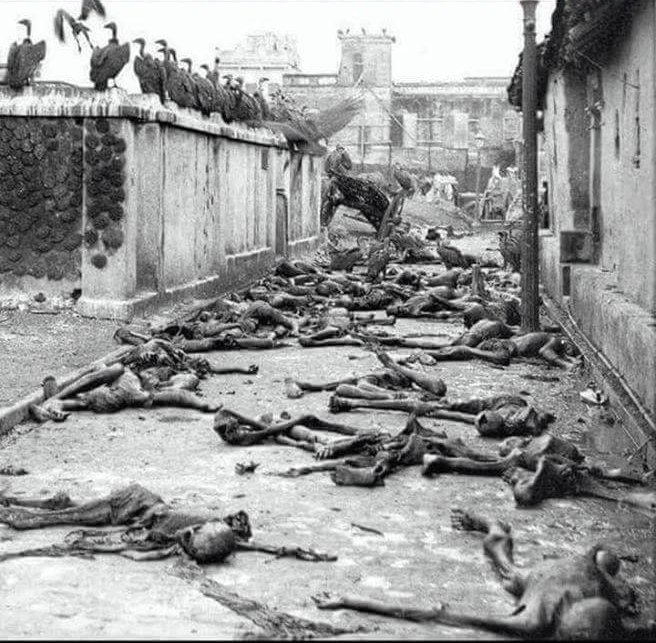
Vultures feast on children starved to death 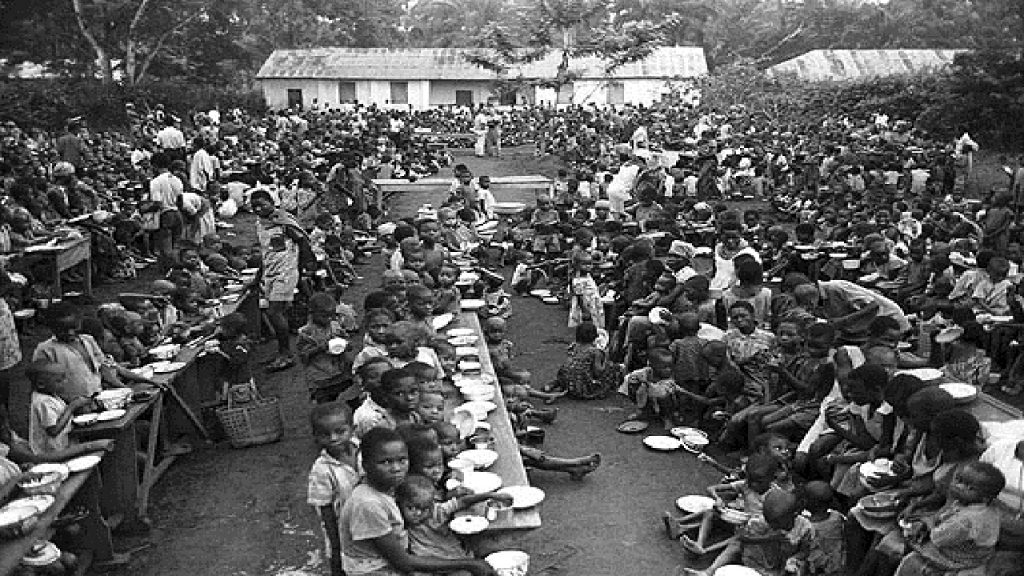
Biafra, Oct.1968 Catholic feeding centre north of Owerri. 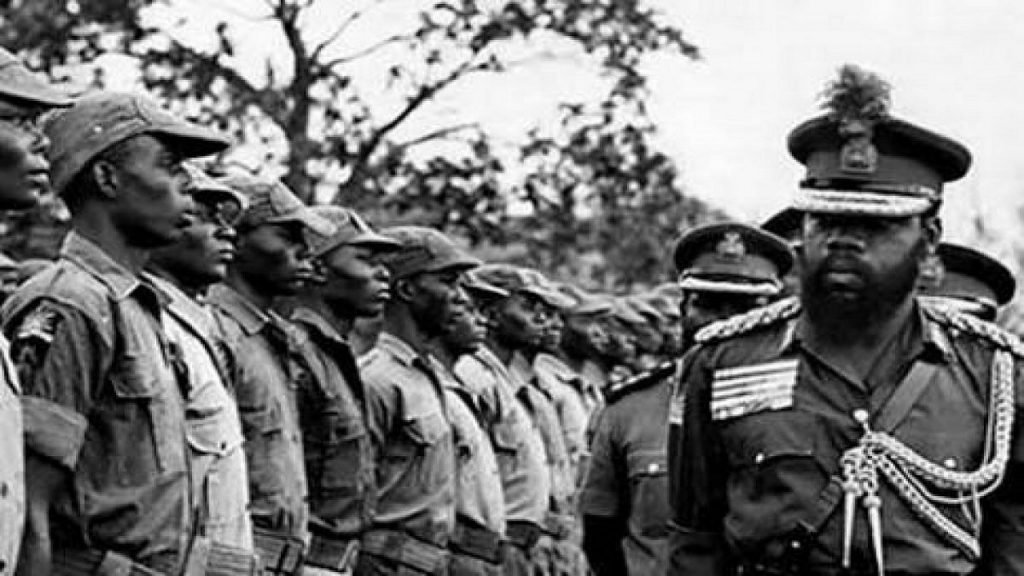
Biafran soldiers with their commander (Ojukwu) 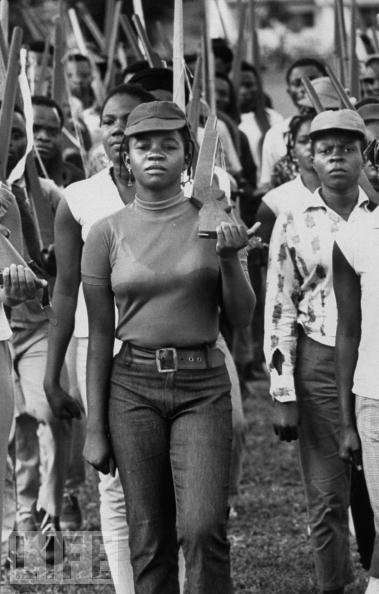
Young Biafran women receiving training 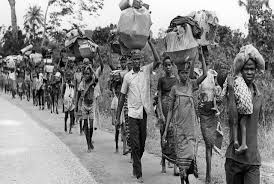
Biafrans flee to refugee camps 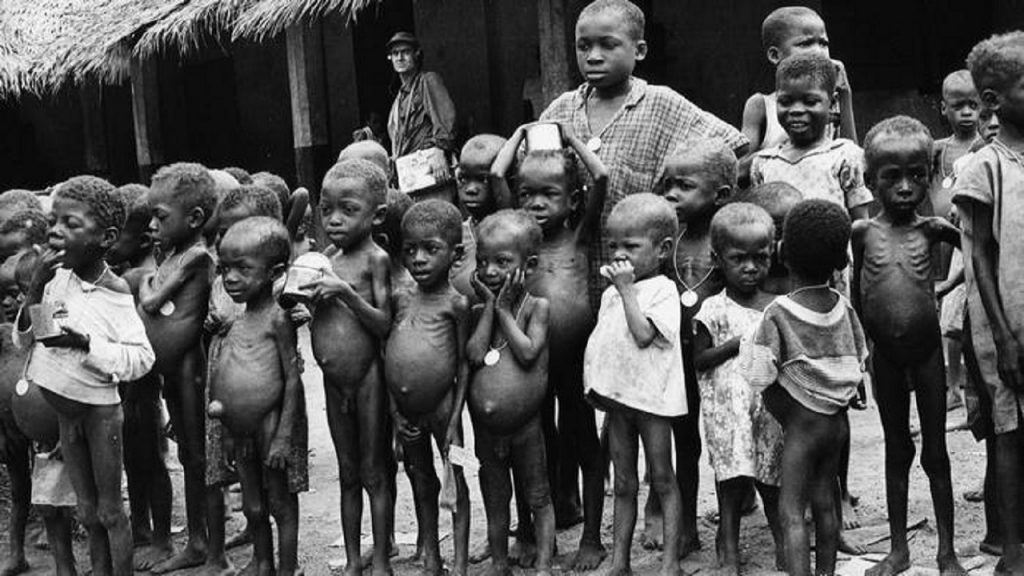
Starving Biafran children 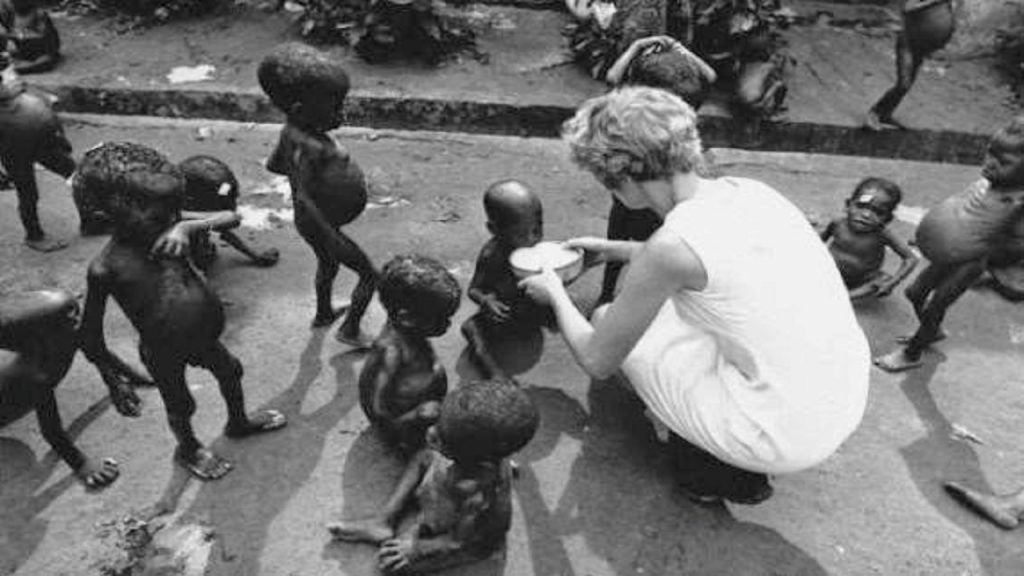
Aids for the starving children
Life after the war among the Biafrans
Almost every family lost one or more persons during the war; men, women, youths and children. You couldn’t even talk about the huge properties that were destroyed from both Nigerian and Biafran side but more on the Biafran side who were fighting from their own territory.
After the surrender of Biafra, which was facilitated by the then Biafran Vice President Major General Philip Effiong, many Igbos who fled the conflict returned for their properties but this was impossible because the new occupants held unto them in perpetuity and this became law in the Abandoned Properties Act (28 September 1979).
At the end of the war, bank accounts owned by Biafrans were seized by the Nigerian government following a Nigerian panel resolve to give any Igbo person with an account only 20 pounds (Of course for those who were alive after the war). More so, federal projects in Biafra were also greatly reduced compared to other parts of Nigeria.
They situation remained almost the same till date as there are some limits of federal projects in the southeast. Many groups have risen to call for the same Republic of Biafra such as; Movement for the Actualization of the Sovereign State of Biafra (MASSOB), Indigenous People of Biafra (IPOB), Biafra Nations League (BNL) and other. The current struggle is being championed by the IPOB group whose leader is based in the UK.
The Igbos are industrious in nature and they have survived the war with the 20 pounds they were given after the war. It is almost impossible to erase the Biafran war and struggle from their minds, for them, Biafra is an ideology.
Today, 30th May 2021, the people of Biafra is remembering the death of their “Heroes” who died during the war. Nigerian government has failed to to incorporate the war in their schools as part of their history courses aiming for the total erasure of the horror experience which the Biafran see as “Genocide”


